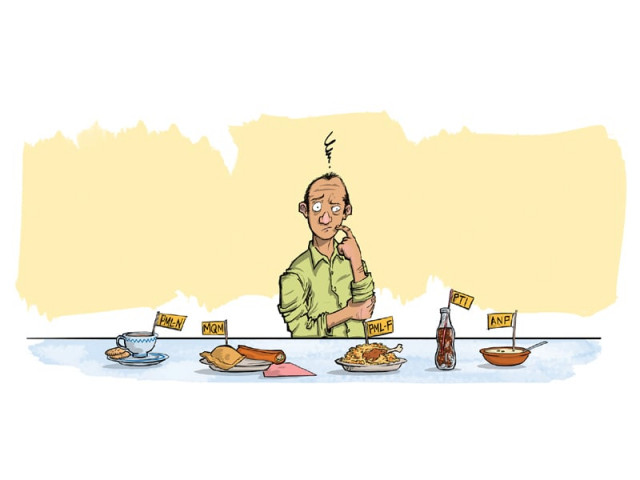It’s crunch time: Eating your way to the ballot box
Do political parties use food to gain voters and loyalties?

Do political parties use food to gain voters and loyalties? ILLUSTRATION: JAMAL KHURSHID
Hospitality and khaana pilana is said to be the key to fostering better relations. Whether it’s a mother-in-law arranging a feast for her beloved son-in-law, a wife cooking her husband’s favourite food or a mother stirring up snacks for her children, a table full of goodies wins hearts like no other.
So with elections approaching, can political parties incorporate good food as a strategy to win voters and volunteers?
The Express Tribune spoke to some party office bearers about the role played by appetising food in politics — can citizens be enticed by samosas and biryani at jalsas?
“It is not our intention to gather votes through food — we don’t try to lure in voters,” says Shama Munshi, Media Coordinator for Pakistan Muslim League-Functional (PML-F). “Some parties lure people in by paying a solid amount in cash; we can never do that.” Munshi emphasises that while the party does not serve food at jalsas, they are hospitable towards guests at press conferences. “We properly entertain our guests with hi-tea; if it’s dinner time, then with a dish like qorma or biryani,” she adds.
For PML-F supporters who crave a glimpse of their leader, the current Pir Pagara created history by attending a jalsa on December 14 in Hyderabad last year, since the previous leaders had not come into the limelight at rallies for 35 years. “Since it was such a rare feat and a special day, we served burger packs” says Munshi. She clarifies, however, that food is not served to buy loyalties.
“It’s an absurd idea to serve food at a jalsa because the head count isn’t always the same as anticipated,” says Saleem Zia, the secretary general of Pakistan Muslim League-Nawaz (PML-N). “However, during Ramazan, Iftar is served if any major gatherings take place and tea is served at press conferences that take place at the press club.” Information Secretary of the Pakistan People’s Party (PPP) Karachi division Latif Mughal concurs with the statement; they, too, serve hi-tea only at press conferences.
The Awami National Party (ANP) believes in hospitality and gratitude, saying it is part of the Pakhtun culture. They offer filling meals to those who attend press conferences. “We have biryani and qorma as well as sweet dishes like zarda and kheer. In the early hours, we serve refreshments,” says Abdul Malik, ANP’s Media Cell in-charge, adding that the party funds are used to finance the treats.

When asked why the same practice isn’t applied to jalsas, Malik says, “We are a nazariyati tehreek [an ideological movement], not a khilao pilao one [a food-based movement]. So no food is served at jalsas.”
For the Muttahidda Qaumi Movement (MQM) and Pakistan Tehreek-e-Insaf (PTI), the case is a little different — they serve food at their events, but not to everyone.
“Food is usually arranged for those who are on duty — volunteers who work for us from dawn to dusk,” says Nasir Jamal, Joint in-charge, Central Information Committee, MQM. “It’s not meant for the general public because the MQM is a middle-class working party. We know if food is served in surplus, the bill will be out of reach for us.” He admits however, that at press conferences, refreshments including rolls and samosas are served to all and at lunch time, biryani boxes are available for those in luck.
The PTI also believes catering to thousands of people who flock to jalsas is an impossible feat but knows it’s important to provide refreshments to organisers. “There are two kinds of volunteers that the PTI has: spot-on volunteers and those who work tirelessly on social media in pre-jalsa campaigning,” says Arsalan Taj Ghumman, Central Vice President of Insaf Student Federation, PTI. “Refreshments for such volunteers is mandatory on our part.”
However, he admits this pattern only applies to the cities and not rural regions where rally organisers fund food for those present in the audience because they come from the same baradari. In rural Punjab, the choice of food is normally channa pulao and in rural Sindh, biryani.
Published in The Express Tribune, April 3rd, 2013.
Like Life & Style on Facebook for the latest in fashion, gossip and entertainment.



















COMMENTS
Comments are moderated and generally will be posted if they are on-topic and not abusive.
For more information, please see our Comments FAQ